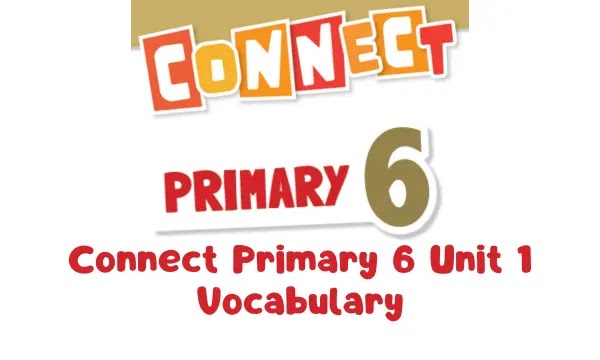Connect Primary 6 Unit 1 Vocabulary
Ancient Artifacts
Ancient:
- Meaning: Very old, from a time long ago.
- Example: The pyramids of Egypt are ancient structures.
- Arabic: قديم
Artifact:
- Meaning: An object made by a human from a long time ago.
- Example: This pottery shard is an artifact from ancient Greece.
- Arabic: قطعة أثرية
Durable:
- Meaning: Able to last a long time without breaking or being damaged.
- Example: Stone is a durable material that can be used to make buildings that last for centuries.
- Arabic: دائم / متين
Fascinating:
- Meaning: Very interesting and capturing your attention.
- Example: I find ancient history fascinating.
- Arabic: رائع
Glass:
- Meaning: A hard, transparent material that is often used to make windows and bottles.
- Example: The ancient Egyptians were skilled at making glass beads.
- Arabic: زجاج
Gold:
- Meaning: A soft, yellow precious metal that is often used to make jewelry.
- Example: Tutankhamun's tomb was filled with gold treasures.
- Arabic: ذهب
Granite:
- Meaning: A very hard, gray rock that is often used for countertops and monuments.
- Example: The Sphinx in Egypt is made of granite.
- Arabic: جرانيت
Preserve:
- Meaning: To keep something safe from damage or decay.
- Example: Museums help to preserve ancient artifacts.
- Arabic: يحافظ على
Stone:
- Meaning: A hard, solid material that is made up of minerals.
- Example: Many ancient tools were made from stone.
- Arabic: حجر / صخر
Animals in Ancient Egypt
1. Baboon:
- Meaning: A clever monkey with long fur and a flat face, living in groups called troops.
- Example: Baboons groom each other and even use tools like rocks to crack open nuts.
- Arabic: قرد البابون
2. Crocodile:
- Meaning: A large, long-snouted reptile that lives in water and on land, known for its strong jaws and sharp teeth.
- Example: Crocodiles can stay underwater for a long time and ambush prey with surprise attacks.
- Arabic: تمساح
3. Falcon:
- Meaning: A fast-flying bird of prey with sharp eyesight and hooked beak, hunting other birds and small animals.
- Example: Falcons can dive incredibly fast to catch their prey in mid-air, like feathered fighter jets!
- Arabic: صقر
4. Hippopotamus:
- Meaning: The largest land mammal in Africa after elephants, spending most of the day in water with big, bulging eyes.
- Example: Despite their size, hippos are surprisingly good swimmers and can even run fast on land for short distances.
- Arabic: فرس النهر
5. Ibis:
- Meaning: A wading bird with long legs and a curved beak, often found in wetlands and marshes.
- Example: Ibises often feed in groups, probing the mud with their beaks for insects and small creatures.
- Arabic: أبو منجل
6. Monkey:
- Meaning: A type of small to medium-sized primate with fur, tails, and agile hands and feet, living in trees or on the ground.
- Example: There are many different types of monkeys in Africa, from the playful meerkats to the acrobatic spider monkeys.
- Arabic: قرد
7. Snake:
- Meaning: A long, legless reptile with scales, found in various habitats and feeding on different things depending on the species.
- Example: Some snakes are constrictors, wrapping around their prey to squeeze it, while others are venomous, using bites to inject poison.
- Arabic: ثعبان
8. Rat:
- Meaning: A small rodent with fur, a pointed nose, and a long tail, often found in urban areas and grasslands.
- Example: While sometimes considered pests, rats play important roles in ecosystems by eating leftover food and being food for other animals.
- Arabic: فأر
